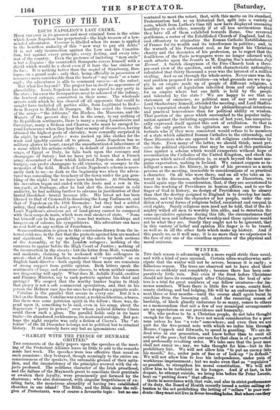"HAMLET WITH THE PRINCE OF DENMARK OMITTED."
THE comments of the daily papers upon the speeches at the meet- ing of the Protestant Alliance leave us little to add to the remarks made last week. The speeches were less effective than usual on such occasions : they betrayed, though seemingly to the entire un- consciousness of the speakers, the untenable ground of their agita- tion, and the inconsistency of the principles avowed with the ob- jects professed. The seditious character of the Irish priesthood, and the failure of the Maynooth grant to conciliate their gratitude or awaken their loyalty, were prominently put forward by the chairman; who also denounced, with singular forgetfulness of ex- isting facts, the monstrous absurdity of having two established churches in one island r. The Bible, and the Bible alone the reli- gion of Protestants, was of course a favourite topic : but ao sue ventured to meet the retort, that, with this motto on its standard, Protestantism had, as an historical fact, split into a variety of sects, which from Luther's time till now have displayed unceasing hostility to each other, scarcely if at all less acrimonious than they have all of them exhibited towards Rome. One reverend gentleman, a rector of the Established Church of England, had the cool effrontery to stigmatize the Roman Catholic Establishment of France for its wealth and its interference in politics ; and, in the warmth of his Protestant zeal, so far forgot his Christian charity and the decencies of his profession, as to regret that the feuilletons of the Paris newspapers were no longer adorned with such attacks upon the Jesuits as M. Eugene Sue's notorious Alf Errant. A Scotch clergyman of the Free Church took a three- per-cent view of the question, and with characteristic nationality calculated that thirty thousand a year was the interest of a million sterling. And so on through the whole series. Never once was the real problem proposed for solution—on what grounds are we to ap- ply to an empire made up of people of different religions, a mode and spirit of legislation inhented from and only adapted for an empire where but one faith is held by the people and tolerated by the state ? We are happy to see that no statesman of eminence, no political man of any note except Lord Shaftesbury himself, attended the meeting; and Lord Shaftes- burv's reputation stands far higher for philanthropical intentions and practical benevolence than for political ability or wisdom. That portion of the press which succumbed to the popular indig- nation against the irritating aggression of last year, has unequivo- cally expressed itself against this sort of retaliation. So that in fact, the only parties to the agitation. are those extreme Pro- testants who if they were consistent would refuse to be members of a state which admitted Roman Catholics to the citizenship, and those Dissenters who are opposed to all religious endowments by the State. Even many of the latter, we should think, must per- ceive the political objections that may be urged at this particular time against a scheme which would exasperate without hope of reconciliation the Catholics of the United Kingdom and check the progress which mixed education is, so much beyond the most san- guine expectation, making in Ireland. We cannot suppose so in- telligent a man as Mr. Binney, in spite of his presence as a mute persona at the meeting, insensible to considerations of so practical a character. On all who were there, and on all who take an in- terest in the discussion, whether Churchmen or Dissenters, we would again urge the consideration, that, if they are accustomed to trace the working of Providence in human affairs, and to see the finger of God in history, no design of Providence can be clearer than that the destiny assigned to England is to develop her hat& tuitions, and to train the character of her people, under the con- dition of several forms of religious belief, coexistent and coeq.ual in civil rights. Surely religious men need not be told, that if Ole Al- mighty willed all men to worship him alike, and to entertain the same speculative opinions during this life, the circumstances that surround men and influence that worship and those opinions would not be what they are. Surely they ought not to be ignorant, -that in this variety of belief and opinion His finger is to be traced, as well as in all the other facts which make up history. And if this puzzle us, as it well may, it is no more than we experience in the face of any one of the countless mysteries of the physical and moral universe.


























 Previous page
Previous page